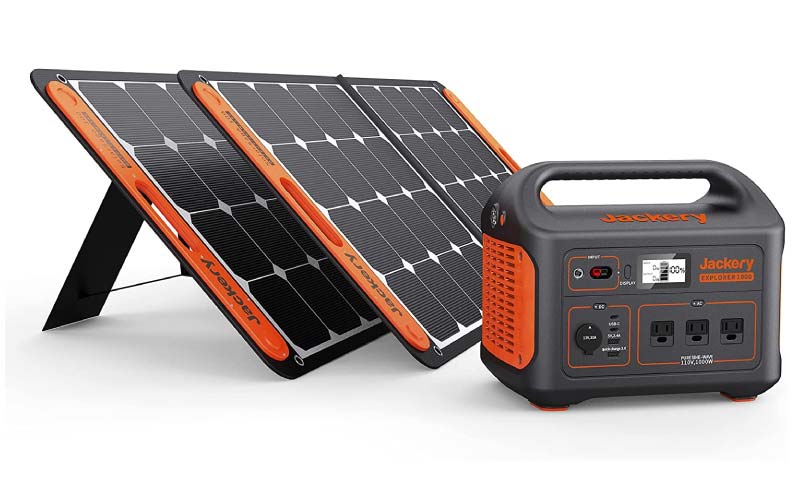Solar Generator Vs Gas Generator – Which One Should I Choose
Finding a proper and better power backup source is very important for your home safety measures in case of a power breakdown or the power grid fails to operate. The best and most powerful solutions to tackle such a situation are solar and gas generators.
You must be confused about choosing between these two. But both solar, as well as a gas generator, have their own benefits and harms. There’s a lot of difference between the features and functioning.
In this article, we have described everything about solar generators and gas generators that can be useful for you to make an ideal choice. Let’s break down how these two types of backup energy work.
Solar Generator Vs. Gas Generator
Before going to the deep comparison let’s check out how each technology works.
How Does A Solar Generator Work?
Solar generators consist of photovoltaic panels, batteries, an inverter, and a charge regulator. The photovoltaic panel allows it to convert the sunlight into electricity and then sends it off to the charged regulator.
The charge regulator pumps the electricity into the batteries and shuts it down when the batteries are fully charged.
The photovoltaic panel also provides direct current electricity but the electricity needed in your home is alternating current. Thus, an inverter helps to convert that direct current electricity into alternating current electricity.
Why Choose A Solar Generator?

A solar generator offers many advantages to any off-grid user. These kinds of generators have a longer lifespan and can last for 55,000 hours as compared to the gas generator that usually lasts up to 2500 hours.
There are many other benefits of choosing a solar generator and they are mentioned below:
Pros Of Solar Generator
No doubt the sun is the major power source for solar generators but there are many other benefits you get through them.
Sun supplies free fuel: A solar generator runs on the fuel directly provided by sunlight. Gas generators require the constant purchase of fuel that can cost you more than your capacity. While in the case of solar generators, there is no fuel cost. All you have to do is simply set up the solar panel and enjoy the free sunshine.
Clean Renewable Energy: Solar generators rely completely on clean, renewable energy. It means you don’t need to worry about the fuel costs to generate power as well as the environment won’t be affected by this.
Also, solar generators do not release any pollutants when they produce or store energy. You can relax by knowing that your camping or boating trip is getting power through a natural and clean source.
Quiet & Requires Low Maintenance: Another important fact about solar generators is their quiet operation. As most gas generators produce heavy noise, this is not the case with solar generators. Also, these generators do not include any moving parts, that’s another reason for not producing any noise which happens in gas generators whenever you try to move them.
With no movement, the main parts of the generator will also be safe from breaking. This will reduce the need for maintenance.
Checkout our guide about the maintenance of generator
Cons Of Solar Generator:
The following disadvantages of solar generators you should keep in your mind:
Upfront Costs: There is a need for a much higher initial investment cost for a solar generator in comparison to a gas generator. The average cost for a solar generator is $2000, while a gas generator usually costs about $1000.
Also, the operating costs of the solar generator are very less. During the lifetime usage, you will be spending only a few operating costs.
Limited Power Supply: The power supplied by the solar generator mainly depends on the size of the battery. It won’t be able to power your entire home but it can help to charge laptops, phones, and other small appliances running for a short period of time.
Although, gas generators aren’t limited in powering and timing such as how long it will power up the entire home as they can be refilled whenever needed.
Slow Charging: The batteries of a solar generator can only be recharged when the sun is out. Even the sun is out, it will take enough time for solar panels to charge the battery. If the power output of a solar panel is 100 watts, it will take approximately 9 hours to charge the mid-sized solar generator battery.
You can checkout this guide to get more information about what is a solar generator
How Does A Gas Generator Work?
A gas generator has the ability to convert the chemical energy of gasoline into mechanical energy and then into electrical energy. It happens by the use of an engine and an alternator. The combustion process takes place in the engine by turning the crankshaft just like in a car. It turns the rotor in the alternator instead of turning the wheels of a car.
The rotor is a coil of copper wire that spins past a stationary magnet. When copper wire passes over the magnets, a slight electric charge induces into the wire. By doing this in a fast manner will generate a significant amount of electricity. Its working mechanism is a bit complex due to several moving parts.
Why Choose A Gas Generator?

Gas generators do not on the principle of solar generators rather they require filling up the fuel tank and then starting operating until the fuel dies. They are totally independent of weather conditions. It doesn’t method if the sky is cloudy or if it’s raining. A gas generator will operate as soon as you supply the fuel and stops only when the fuel reaches an end.
Pros Of Gas Generator
There are the following pros or advantages you can take from a gas generator:
Reliable & Consistent: The amount of energy you get through a gas generator is highly stable and consistent. This stability and consistency make these generators a very reliable choice for power needs.
Quick & Ready to go: All you need to do is to fill the gas tank and the generator will start operating abruptly. You don’t need to wait for hours to make it generate energy and get charged to supply power to you. It only depends on the supply of fuel, nothing else matters at all for its functioning.
High power output: No doubt, a gas generator provides a higher power output rating as compared to a solar generator. This allows operating almost all kinds of appliances at home from a light bulb to even an air conditioner.
Checkout our guide about the what generator size do i need
Cons Of Gas Generator
Unclean fuel source: As a gas generator depends on fuel such as gasoline or propane, it is also a cause of air pollution. Toxic gases such as nitrogen dioxide, sulfur dioxide, and ozone are produced by them and when these gases combine with water, lead to acid rain and other serious environmental issues.
Costs more for frequent use: The more you use it, the more fuel it burns. Similarly, the more costly it will charge the more frequent usage. You can rely on it for the short term as long as a supply of gas is available. But you won’t want to spend a lot of money on a huge amount of gas to keep your generator operating for hours.
Very loud: They are very loud. Whether you are running it or just dragging it around the corner, it is very noisy and would definitely cause headaches to you and your neighbors.
Checkout our guide about the how to make a generator quieter
Setup isn’t Easy
The setup of a gas generator is not that easy. It usually weighs about 45 to 50 lbs. which is a lot more to carry easily.
Features To Keep In Mind Before Choosing Between Solar And Gas Generator
As two of the most powerful sources of power generation are solar and gas generators, each has a number of features that differentiate them and also make one beneficial over the other. There are the following features that need to be focused on while choosing between a solar generator or gas generator.
Reliability:
Which one is more reliable?
An ideal power backup system should be durable, dependable, and long-lasting. In the case of power duration, battery, and solar generators have an advantage over gas generators. For a gas generator, the only possible option in front of you is to use gas as fuel, which can be exhausted at any time.
Similarly, gas generators need to be placed in a well-ventilated area to avoid exposure to harmful gases. But a solar generator relies on sunlight and if due to weather conditions, sun isn’t out there. Then you might be in trouble if you haven’t charged your batteries already.
Grid Interactivity:
A backup generator is only required whenever the power is out. Otherwise, a generator will remain off while collecting dust. If you have a solar generator, then you can charge the battery during day time to use it at night when power won’t be available. You can also charge it from the grid when the demand for power is comparable low and discharge it when the cost for electricity is highest.
This feature isn’t present in gas-powered generators.
Price:
Solar generator appears cheaper as per hour investment but for the job of charging batteries faster and carrying up a much load, a gas generator wins the race. The cost of performing the same electrical task for every hour will be different in the solar generator. While by the cost of one gas generator, you’ll purchase 3 solar suitcases.
So, it mainly be decided by your preference to save money each hour or spend money on power.
Environment Friendly:
Gas generators emit more poisonous gases that are very harmful to the environment. Also, they cause noise pollution in their vicinity. While a solar generator is safer than a gas generator. Also, a solar generator reduces pollution.
Service & Maintenance:
A gas-powered generator requires maintenance on a daily basis. As the engine requires oil, fuel, air, and an appropriate filter for each, let each part be serviced and maintained after usage. A gas-powered generator needs yearly service to ensure they are safe, operational, and clean.
While a solar generator required no maintenance at all.
Incentives:
A gas generator isn’t monetarily incentivized while local, state, or federal incentives are provided for purchasing a battery storage system that can be used in tandem with a solar generator.
Check out our guide about Diesel Vs. Gas Generators
Conclusion
Both of the units do best reliably and consistently. As solar technology is becoming more and more efficient their usage is also getting high. But the importance of gas generators cannot be ignored.
If you want to charge small appliances, then it doesn’t matter which generator you have. But solar generators are coming in different ways these days, acting as small portable external battery packs to recharge the phone. For large-scale power generation, a gas generator will be an ideal option but it will require high costs.

Josh is a highly skilled electrician with specialized expertise in the field of generators. With years of experience under his belt, he has established himself as an expert in all aspects of generators, ranging from installation and maintenance to troubleshooting and repairs. Josh’s in-depth knowledge of electrical systems and his commitment to staying updated with the latest industry advancements make him a reliable and sought-after professional.
